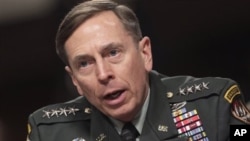The U.S. Congress demonstrated bipartisan support for the war in Afghanistan this week as the House of Representatives easily rejected a call to pull all U.S. troops out of Afghanistan by the end of this year. But supporters of the war were a bit shaken by a new public opinion poll that found two-thirds of those asked now oppose the war.
The House vote was 321 to 93 against withdrawing U.S. troops by the end of this year. It capped an up and down week for supporters of the Afghan effort in the wake of a Washington Post-ABC News poll that found 64 percent of those surveyed do not believe the war is worth the cost. That is a big change from late in 2009 when a majority in the same poll supported the war.
The slipping public support was a major point of discussion this past week in two congressional hearings on the Afghan war that featured testimony from the commander of international forces in Afghanistan, U.S. General David Petraeus, who detailed the progress NATO forces are making against the Taliban.
"While the security progress achieved over the past year is significant, it is also fragile and reversible," he said.
Congressman Walter Jones, a Republican from North Carolina, is a longtime critic of the Afghan war effort. Jones worries that the Afghan government could ask U.S. troops to stay even after 2014, the target date for the end of U.S. and NATO combat operations in Afghanistan.
"15, 16, 17 years? For God’s sake, how much more can we take? How much more can we give, treasure and blood," he said.
General Petraeus told Jones that he understands the war has dragged on for ten years, but he says U.S. troops must finish the job of denying al-Qaida the chance of once again using Afghanistan as a safe haven to launch attacks on the United States.
"I understand the impatience of the U.S. people. I’m impatient,” he said. “But I just want us to get out under the right conditions, to achieve our objectives and gradually to transition tasks to our Afghan counterparts."
U.S. public support for the war has been dropping for some time, says political expert Jack Pitney.
"The classic pattern in public opinion is for support for a war to drop off over time and as casualties mount and that is exactly what is happening here,” he said. “People keep hearing stories about Americans dying in combat, and yet they don’t see really concrete and dramatic signs of progress."
Pitney is a professor of American politics at Claremont McKenna College in California. He says that while opposition to the war has grown in recent years, it has largely been quiet opposition.
"There is dissatisfaction but it doesn’t have any great intensity,” he said. “You don’t have the same kind of demonstrations you had against Vietnam or the Iraq War, in part because the numbers are smaller and in part because it is an all-volunteer force, unlike Vietnam."
War supporters in Congress took note of the recent poll but say they are not alarmed.
Senator Joseph Lieberman is an independent Democrat from Connecticut who says it is time to rebuild public support for Afghanistan.
"You can’t make decisions about war and peace based on public opinion,” he said. “We are succeeding in Afghanistan today and therefore I think the downward turn in the public opinion here in the United States has more to do with the understandable preoccupation of the American people with the economy, with jobs, with the deficit. In that sense I think we have to come back and remind the American people of why we are in Afghanistan, why it is worth it and that we are now succeeding."
The Afghan conflict enters a crucial phase this year as the United States prepares to begin the withdrawal of some troops later this year, depending on security conditions on the ground.
"The polls have been all over the lot, but if you look at the long-term trend it is pretty clear that Americans have become somewhat disaffected with the Afghanistan war, mainly because it has lasted so long,” said Larry Sabato, who directs the Center for Politics at the University of Virginia. “I think the public is trying to give President Obama a nudge in the direction of withdrawing more rather than fewer troops when he comes up against his deadline this August."
Perhaps mindful of that, Republican Senator John McCain of Arizona, an outspoken supporter of the war effort, says what happens on the ground in Afghanistan over the next few months will be important in rebuilding public support for the war.
"A majority of Americans no longer support the war,” he said. “The next several months will therefore be decisive as winter turns to spring, the traditional fighting season in Afghanistan."
Political expert Larry Sabato says the concern over Afghanistan could spill over into next year’s presidential campaign.
"We don’t know how this is going to play out. But I think if the public continues to be disaffected with the war, then it is going to find a way to work itself into the election campaignm," he said.
Polls show Democrats tend to be less supportive of the war effort than Republicans. But that may be changing. Mississippi Governor Haley Barbour, who is considering a run for president in 2012, is now openly questioning the war effort, and experts say that Afghanistan could emerge as an issue in the race for the Republican Party’s presidential nomination next year.
Conflicting Signals Surface on US Support for Afghan War
- By Jim Malone





